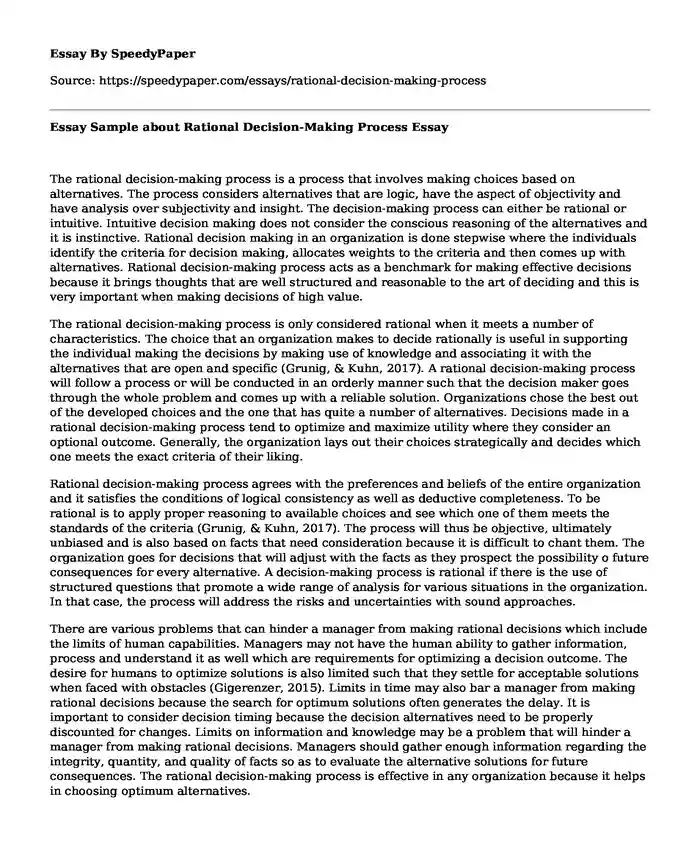
| Type of paper: | Essay |
| Categories: | Management |
| Pages: | 3 |
| Wordcount: | 598 words |
The rational decision-making process is a process that involves making choices based on alternatives. The process considers alternatives that are logic, have the aspect of objectivity and have analysis over subjectivity and insight. The decision-making process can either be rational or intuitive. Intuitive decision making does not consider the conscious reasoning of the alternatives and it is instinctive. Rational decision making in an organization is done stepwise where the individuals identify the criteria for decision making, allocates weights to the criteria and then comes up with alternatives. Rational decision-making process acts as a benchmark for making effective decisions because it brings thoughts that are well structured and reasonable to the art of deciding and this is very important when making decisions of high value.
The rational decision-making process is only considered rational when it meets a number of characteristics. The choice that an organization makes to decide rationally is useful in supporting the individual making the decisions by making use of knowledge and associating it with the alternatives that are open and specific (Grunig, & Kuhn, 2017). A rational decision-making process will follow a process or will be conducted in an orderly manner such that the decision maker goes through the whole problem and comes up with a reliable solution. Organizations chose the best out of the developed choices and the one that has quite a number of alternatives. Decisions made in a rational decision-making process tend to optimize and maximize utility where they consider an optional outcome. Generally, the organization lays out their choices strategically and decides which one meets the exact criteria of their liking.
Rational decision-making process agrees with the preferences and beliefs of the entire organization and it satisfies the conditions of logical consistency as well as deductive completeness. To be rational is to apply proper reasoning to available choices and see which one of them meets the standards of the criteria (Grunig, & Kuhn, 2017). The process will thus be objective, ultimately unbiased and is also based on facts that need consideration because it is difficult to chant them. The organization goes for decisions that will adjust with the facts as they prospect the possibility o future consequences for every alternative. A decision-making process is rational if there is the use of structured questions that promote a wide range of analysis for various situations in the organization. In that case, the process will address the risks and uncertainties with sound approaches.
There are various problems that can hinder a manager from making rational decisions which include the limits of human capabilities. Managers may not have the human ability to gather information, process and understand it as well which are requirements for optimizing a decision outcome. The desire for humans to optimize solutions is also limited such that they settle for acceptable solutions when faced with obstacles (Gigerenzer, 2015). Limits in time may also bar a manager from making rational decisions because the search for optimum solutions often generates the delay. It is important to consider decision timing because the decision alternatives need to be properly discounted for changes. Limits on information and knowledge may be a problem that will hinder a manager from making rational decisions. Managers should gather enough information regarding the integrity, quantity, and quality of facts so as to evaluate the alternative solutions for future consequences. The rational decision-making process is effective in any organization because it helps in choosing optimum alternatives.
References
Gigerenzer, G. (2015). Simply rational: Decision-making in the real world. Evolution and Cognition.
Grunig, R., & Kuhn, R. (2017). Rational Decision-Making. In Solving Complex Decision Problems (pp. 25-34). Springer, Berlin, Heidelberg.
Cite this page
Essay Sample about Rational Decision-Making Process. (2022, Aug 31). Retrieved from https://speedypaper.com/essays/rational-decision-making-process
Request Removal
If you are the original author of this essay and no longer wish to have it published on the SpeedyPaper website, please click below to request its removal:
- Essay Example: Claude Mckay's My Native Land, My Home Analysis
- Free Essay on Legalization of Marijuana in Canada
- Business Essay Sample: Pudgy Point Restaurant Profits Scenario
- The Ugly Duckling, Literary Essay Sample
- Free Essay on How Popularity and Emotional Instability Influence Bullying
- Free Essay: White Collar Crimes and Human Trafficking in Southern Utah
- Paper Example. Latest Progress in Cancer Immune Escape
Popular categories




